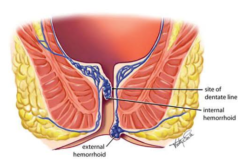
Hemorrhoids, also known as piles, are swollen veins located in the lower part of the rectum and the anus, similar to varicose veins. They can develop inside the rectum (internal hemorrhoids) or under the skin around the anus (external hemorrhoids). While often uncomfortable, hemorrhoids are not usually dangerous but can indicate more serious conditions and significantly impact the quality of life.
Symptoms of Hemorrhoids
Recognizing the symptoms of hemorrhoids is crucial for timely treatment. Symptoms vary depending on the type of hemorrhoid and can include:
- Painless Bleeding: Noticing small amounts of bright red blood on your toilet tissue or in the toilet bowl is often a symptom of internal hemorrhoids.
- Itching or Irritation: Especially around the anus, typically associated with external hemorrhoids.
- Pain and Discomfort: This can occur when sitting, especially if the hemorrhoids are external or if an internal hemorrhoid prolapses (pushes through the anal opening).
- Swelling Around the Anus: A common sign of external hemorrhoids.
- A Lump Near the Anus: This may be sensitive or painful, indicating an external hemorrhoid or a prolapsed internal hemorrhoid.
- Leakage of Feces: This can occur with hemorrhoid conditions, causing additional discomfort and irritation.
When Is Surgery Needed?
Most hemorrhoids can be effectively treated with home remedies, lifestyle changes, and over-the-counter treatments. However, when these measures do not provide relief, or if the hemorrhoids are particularly large, painful, or prone to bleeding, surgical options may be considered. Surgery may also be recommended for those with recurrent bouts of hemorrhoids or complications such as significant bleeding or prolapse. Common surgical treatments include:
- Hemorrhoidectomy: This is the most effective and complete way to treat severe or recurrent hemorrhoids. The procedure involves removing the excess tissue that causes bleeding. The surgery can be performed under general anesthesia and requires a period of recovery, during which pain can be managed with medications.
- Rubber Band Ligation: A minimally invasive procedure where a rubber band is placed around the base of an internal hemorrhoid to cut off its blood supply, causing it to wither and fall off. This treatment is suitable for internal hemorrhoids that have not been managed by more conservative treatments.
- Sclerotherapy: An injection of a chemical solution directly into the hemorrhoid tissue to shrink it. This method is typically used for smaller hemorrhoids.
- Infrared Coagulation: A procedure that uses infrared light to cause scar tissue, which cuts off the blood supply to the hemorrhoid, causing it to shrink. It's often used for smaller internal hemorrhoids.
Lifestyle Changes and Home Remedies for Managing Hemorrhoids
Alongside medical treatments, lifestyle adjustments, and home remedies play a pivotal role in managing hemorrhoids and preventing their recurrence. Increasing fiber intake through fruits, vegetables, and whole grains can significantly ease bowel movements, thus reducing the strain that can provoke hemorrhoids. Adequate hydration is equally important, as it softens stool and further facilitates a smoother digestive process. Regular exercise, maintaining a healthy weight, and avoiding prolonged sitting can also alleviate pressure on the rectal area and prevent the development of new hemorrhoids. For immediate relief of symptoms, soaking in a warm bath or using over-the-counter creams and suppositories can provide comfort and reduce inflammation.
Seeking Professional Medical Advice
While self-care and home remedies are instrumental in managing hemorrhoid symptoms for many, it's imperative to consult a healthcare professional if you're experiencing persistent or severe discomfort. A medical provider can offer a definitive diagnosis, recommend appropriate treatment options, and rule out more serious conditions that may mimic hemorrhoid symptoms, such as colorectal cancer. Timely medical advice is crucial, especially if symptoms include significant bleeding, severe pain or if over-the-counter treatments fail to provide relief within a week. Remember, early intervention can prevent complications and ensure better health outcomes.
Conclusion
Hemorrhoids are a common condition with a range of symptoms that can affect daily activities and overall quality of life. While many cases can be managed with non-surgical treatments, surgery may be necessary for severe or persistent cases. If you are experiencing symptoms of hemorrhoids, it is important to consult with a healthcare provider for an accurate diagnosis and to discuss the best treatment options based on your specific situation. Early intervention can prevent complications and provide significant relief.
